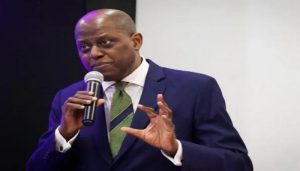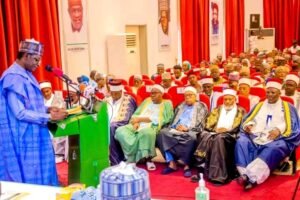
_ Outgone Group Managing Director/CEO, Mr. Kennedy Uzoka(left); Group Chairman, Mr. Tony Elumelu ; and New Group Managing Director/CEO, Mr. Oliver Alawuba, at the corporate event to announce the new GMD and Executive Directors for United Bank for Africa(UBA) Group,, held at the Tony Elumelu Amphitheatre, UBA House, Lagos ….yesterday_
By David Akinmola
Group Managing Director/Chief Executive Officer of United Bank for Africa (UBA) Plc, Oliver Alawuba, has called for deeper intra-African trade and investment to cushion the continent against mounting global tariff pressures and supply chain disruptions.
Speaking at a regional trade and finance forum in Lagos, Alawuba said Africa must urgently reduce its dependence on extra-continental markets by strengthening cross-border trade flows under the African Continental Free Trade Area (AfCFTA) framework. He stressed that closer economic integration will enable African economies to leverage their collective market size, diversify revenue sources, and build resilience against external economic shocks.
“With rising trade protectionism and shifting global economic alliances, Africa cannot afford to be at the mercy of external tariff regimes,” Alawuba said. “By promoting intra-African trade, we not only create new growth opportunities but also safeguard the continent’s long-term economic sovereignty.”
He noted that while the AfCFTA presents a historic opportunity for Africa to boost its share of global trade, the agreement’s full benefits can only be realised through investments in infrastructure, harmonised regulations, and efficient payment systems.
UBA, Alawuba added, remains committed to supporting regional commerce by expanding its presence across 20 African countries, financing cross-border trade deals, and driving digital payment solutions tailored for the continent’s unique market needs.
Trade experts at the forum agreed that fostering stronger economic ties among African nations could help offset the risks of fluctuating global tariffs, currency volatility, and unpredictable policy shifts in key export markets.






